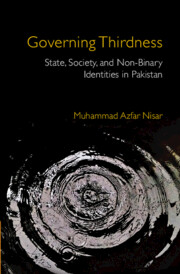Book contents
Part I - Social Governance
Published online by Cambridge University Press: 10 December 2021
Summary
There is no subject, no body, sex or gender, prior to the repressive constraints and generative power of culture … If transvestites, hermaphrodites, and other transgender categories occupy a space of desire and possibility, of undecidability, then they do so no less as socially and historically constituted subjects than as those who inhabit the conventional space … they interrupt. (Johnson 1997, 24–25)
When I began my fieldwork, it seemed that the following generic, ready-made response captured the reason for all khawaja sira joining the community.
From the beginning, I used to like playing with girls. I loved playing with dolls. I also liked putting on my mother's [or sister’s] make-up, wearing feminine clothes and dancing. I also used to perform feminine roles at home. My family couldn't accept that as I grew up. That is the reason why I left home and joined the khawaja sira community.
However, it was only gradually that I began to understand that this homogenizing narrative hides a whole range of underlying heterogeneous origins of the individuals who eventually become part of the khawaja sira community, some of which do not have anything to do with their desire to be performative women. As I gradually became more familiar with the khawaja sira and their vernacular (Farsi), some of them were kind enough to open up more about their childhood and share some uneasy details. I met Chandi, a young khawaja sira, living in a slum on the outskirts of Lahore. She had been raped repeatedly in her childhood by her uncle. The trauma of that episode had clearly not left her:
Only those who have been raped in youth join this [the khawaja sira] community … Once you have been raped, that never leaves you since everyone around you knows that about you. Such people, even if they leave their homes and shift somewhere else know this in their hearts [that they were raped]. Gradually, such people start developing feelings that they should have a boyfriend … The khawaja sira always starts like that.
- Type
- Chapter
- Information
- Governing ThirdnessState, Society, and Non-Binary Identities in Pakistan, pp. 37 - 41Publisher: Cambridge University PressPrint publication year: 2022



